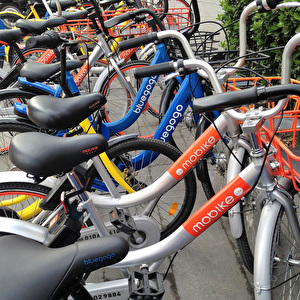Q2 2017 Chinese Bike-Sharing Industry Matrix

In less than a year, China's dockless bicycle-sharing market has exploded from a handful of players and tens of thousands of bikes to become one of the hottest segments in China’s IT sector. Two of the top players now have valuations reportedly as high as USD 3 billion, have deployed a combined total of over 14 million bicycles, and, together with several of the other leading operators, have begun accelerating overseas expansion efforts.
In 2016, total users of dockless bicycle-sharing services in China reached over 20 million, and total market size exceeded RMB 1 billion. Rapid expansion into new cities and steady uptake by new users will drive up these figures dramatically in 2017 to over 200 million users and nearly RMB 10 billion in revenues.
User and turnover growth will get a further boost from the development of additional revenue streams and a major push into overseas markets. Although China’s dockless bike-sharing operators have focused mainly on user fees so far, those that have scaled most successfully are also now exploring additional revenue streams that leverage the massive volume of data they have collected. Similarly, while the geographic focus of most players has largely been limited to China, the top operators have already begun trial operations in several overseas markets, and, looking to capitalize on their accumulated industry knowledge, secured supply chain advantages, and strong financial backing, are preparing to rapidly accelerate overseas expansion efforts.
The breakneck speed at which China’s bike-sharing market has grown has also brought a number of challenges. In many cities, areas around major subway stations and office buildings, none of which were designed with sufficient bicycle parking space, have become clogged with tangles of shared bikes, and users frequently park bikes irresponsibly, blocking both car and pedestrian traffic. The security of user deposits and personal information has also become a concern, especially in light of the proliferation of smaller bike-share operators who may have less robust safeguards in place and face greater risk of insolvency. To address these and other related issues, regulators at both the national and local levels have begun to introduce increasingly strict rules that may impact growth rates and favor certain operators.
China’s number of bike-share operators has also skyrocketed to well over 40, raising the question of how the industry will consolidate as Mobike and ofo, the two dominant firms, continue to pad their leads. Some players believe if they carve out specific niche markets, they will become prime acquisition targets, but the risk of simply being squeezed out of the market remains high.
Several key trends that emerged or accelerated in Q2 2017 include:
- Oversupply in tier-1 cities
- Overseas expansion
- Revenue stream diversification
- Strategic refocus by many operators, small and large, to avoid head-on competition with top 2
- Profusion of small, local players
- Market exit by some smaller operators
- Introduction of more stringent regulations in many cities
To help investors and potential technology, channel, and marketing partners identify opportunities in China’s booming bike-sharing industry, Marbridge has researched and formulated the Chinese Bike-Sharing Industry Matrix. The Q2 2017 edition of the Matrix provides details, in Excel (read-only) format, on:
Bike-Sharing Operators (28)
- Location (city in which headquartered)
- Company Business Scope (if broader than dockless bike-share)
- Company Homepage URL
- Date Established
- Date Service Launched
- Executive Management
- Service Overview
- Bike Models & Features
- Bike Production Costs
- Bike Life Expectancy
- Total Bikes Deployed
- Cumulative Rentals
- Average Daily Rentals
- Average Rentals Per Bike Per Day
- Total Users
- Rental Fee
- Rental Deposit
- Non-fee-based Revenue Stream Strategy
- Cities Covered (China & Overseas)
- Coverage Targets
- Hardware Partners
- Technology, Channel, & Marketing Partnerships
- Funding Information (Rounds, Sums, & Investors)
Regulatory Issues
The Chinese Bike-Sharing Industry Matrix also features a section detailing relevant regulatory developments at both the national and local levels.
Disclaimer: For some operators detailed in the Chinese Bike-Sharing Industry Matrix, particularly some of the smaller players, some portion of the complete data set may not be available. Also, the Matrix covers only non-motorized bike-sharing, so does not include electric bike-sharing service operators.
PRICE: US$3,500 stand-alone, or US$1,750 for Marbridge Daily Premium Subscribers
For more detailed inquires, you can also contact us via email at salesteam@marbridgeconsulting.com.

